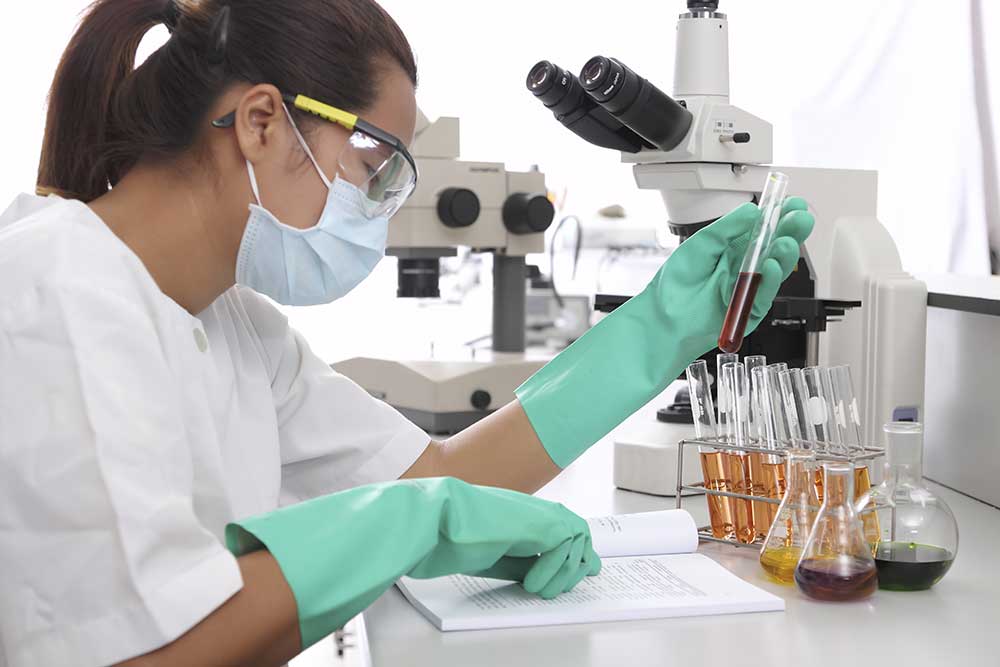Medical laboratory technicians are responsible for a variety of activities, including the analysis of bodily fluids and cells and transfusion matching blood. The job involves the use of sophisticated laboratory equipment.
With continuous technical developments, laboratory work has become more analytical, so laboratory workers should have excellent judgment skills. Medical laboratory technologists, who must have a bachelor’s degree, are reserved for more advanced procedures.
Technicians, who are expected to hold at least an associate degree and frequently work under technologist supervision. If you’re curious about this career and how much you can earn, read on to find out more.

Medical Laboratory Technologist: Overview of Job
Medical laboratory technologists or technicians collect, examine, and analyze samples of bodily fluids, tissues, and other substances from patients and discuss their findings with doctors.
Clinical and medical laboratory technicians have associate qualifications, whereas other medical laboratory scientists have baccalaureate qualifications.
Although some of the laboratory work carried out by these professionals is the same, the aim of laboratory technicians is to collect, process, and analyze biological specimens.
Additionally they must maintain instruments, and relate their findings regarding common diseases or conditions to doctors.
Where Do They Work?
In a wide variety of contexts, medical laboratory technicians and medical laboratory scientists may find demanding work in the following areas.
- Clinical labs in the hospital
- Commercial or research labs
- Laboratoires for public health
- The chemical or pharmaceutical industries
- Biotechnology pioneers
- Laboratories forensics and law enforcement
- Veterinary Hospitals
- Institutes for study and teaching
- Centers for Transplants and Organ Donors
- Fertility Hospitals
- The cosmetics industry, or food industry
Overview of Salary
According to the Bureau of Labor Statistics, the median wage for medical laboratory technicians or technologists (half earned more than this amount and half earned less) was $60,520 in May 2015.
The lowest 10% earned less than $41,510, and the top 10% earned more than $84,300.
According to the Bureau of Labor Statistics, the median wage for medical laboratory technicians (half earned more than this amount and half earned less) was $38,970 in May 2015. The lowest 10% earned under $25,890, and the highest 10% earned more than $60,810.
The Bureau of Labor Statistics estimates that between 2014 and 2024, jobs for medical laboratory technicians and medical laboratory scientists would rise by 16 percent, far faster than the average for all occupations.
Salary Per State: Which State Gives More?
We also took into account the cost of living in-state to allow the comparison of wages across the US.
This index is the division of average pay by cost of living compared to the average for a state. For instance, California’s cost of living index is 135.9, and the average pay is $80,500, so our index value will be: $80,500 * (100/135.9) = $59,234.
Here are the top 5 states with the highest average salaries for medical laboratory technologists.
- Nevada – $72,180
- Tennessee – $61,310
- Idaho – $62,200
- Wyoming – $61,340
- Mississippi – $56,560
How to Become a Medical Laboratory Technologist
One of the most attractive aspects of this career is that it is reasonably easy to obtain the educational and training requirements.
Many clinical laboratory technicians have an associate degree from a community college or junior college program accredited by the National Clinical Laboratory Sciences Accreditation Agency.
Others actually get a hospital or a technical school diploma. In addition, a small number of technicians use on-the-job training to learn their skills.
Where to Apply
You can apply on the following websites.
- CompHealth
- Indeed
- Glassdoor
- SimplyHired
Workplace Options
Health and clinical laboratory technologists work in laboratories for hospitals, pharmaceutical companies, research centers, and other laboratory environments.
They are experts in different research disciplines, so it is normal to work outside of the medical laboratory. Many technologists are working in positions of government, such as the FDA, the USDA, non-medical industrial laboratories, and development.
More experienced laboratory technologists will progress by conducting research, developing new analytical methods, and managing and educating laboratory technicians.

Conclusion
The job outlook of clinical laboratory technicians and technologists is pretty good. Jobs are projected to increase by 7 percent from 2019 to 2029, faster than the average for all occupations.
An increase in the numbers of the aging population is expected to lead to a greater need in the medical field to diagnose medical conditions through laboratory procedures, such as cancer or type 2 diabetes.